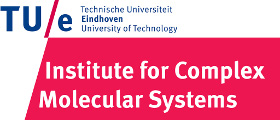Team:TU-Eindhoven/Society
From 2013.igem.org



Contents |
Synthetic Facts: The Project
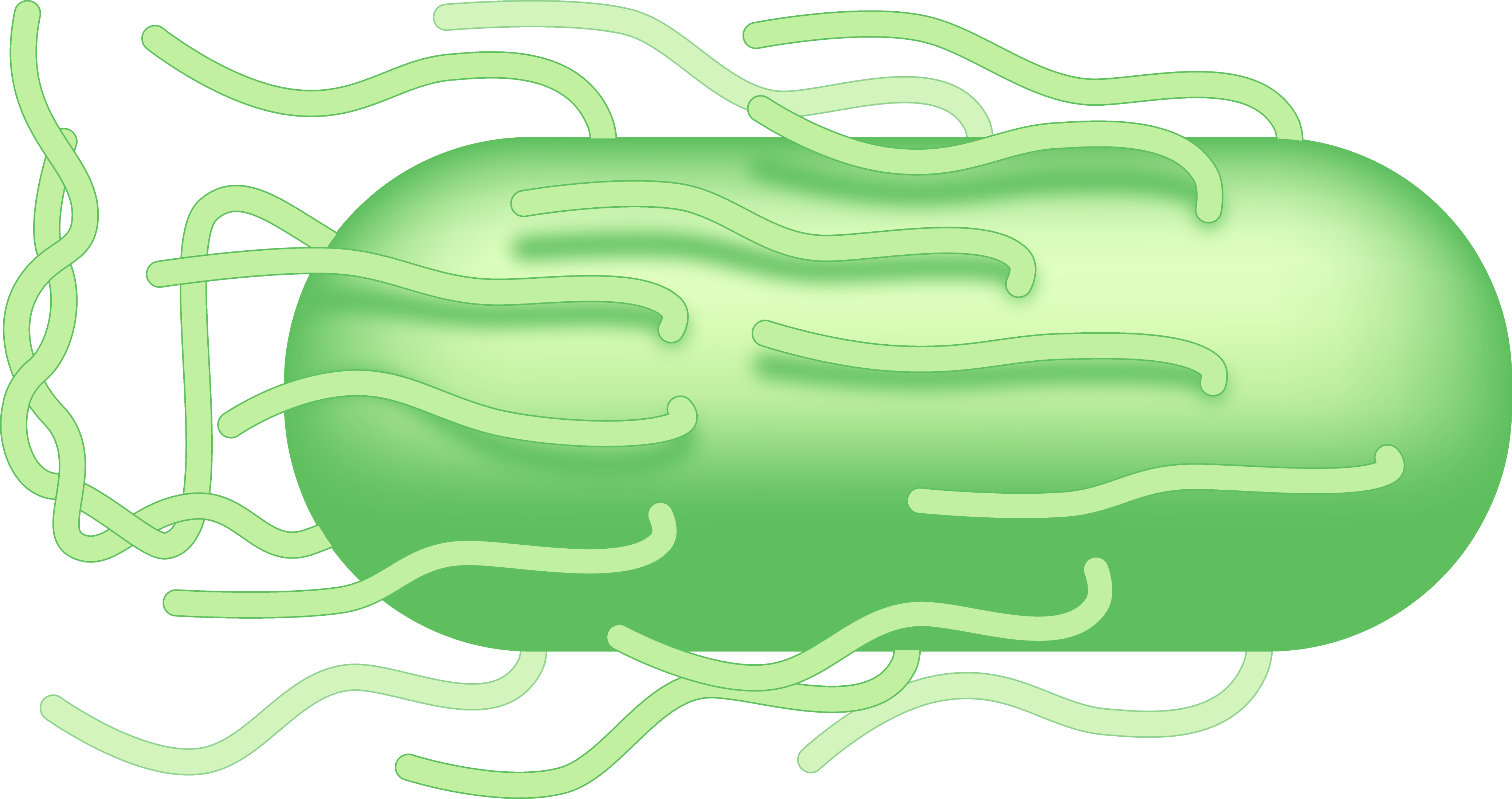

Synthetic Facts: The Idea
- Bringing the world of synthetic biology into everybody’s home.
- Removing the reservations people have about synthetic biology by removing faulty data.
- Collaborating and collecting data across the globe.
[http://syntheticfacts.tue.nl/index.php Check out our Synthetic Facts webpage!]
In this current technological age, anybody with an internet connection is able to find vast amounts of information about any topic they desire, including synthetic biology. However, this information is not always correct and has often not been checked by reliable sources. In the case of Synthetic Biology, having biased or poorly revised information available to the public often translates into barriers for the acceptance of new devices and applications based on bacteria. These barriers represent the greatest threat to the successful development and availability within the market of products based on research like the one developed by our team. This main obstacle can only be surpassed by providing people with the proper unbiased knowledge sources related to synthetic biology and the use of bacteria for clinical and research applications. Thus, the TU Eindhoven iGEM team concerned with this issue, developed a fact checker system as our main human practice project for this year's iGEM competition.
The fact checker system is called Synthetic Facts, its purpose is to help members of the general public associate with the field of synthetic biology. The Fact Checker is available online and allows users to both view and submit facts of their own. Each submitted “fact” is both reviewed and commented on by respected sources. In this way we hope to prove or disprove a number of myths about synthetic biology and thereby promote the idea of synthetic biology to the general public.
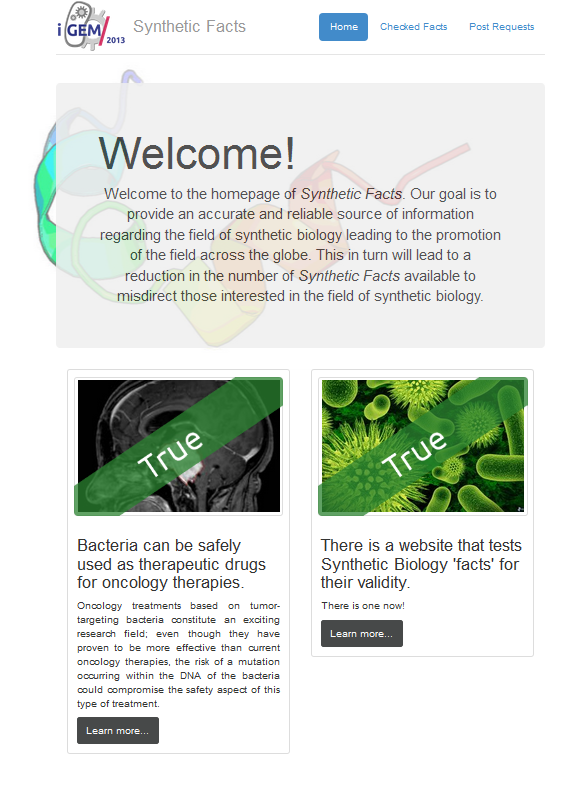
Why?
Among the general public, there are a wide range of attitudes regarding research in the field of synthetic biology. Many people hold a rather conservative position when it comes to genetically modifying organisms. For some, this originates from religious convictions, whereas others fear dramatic consequences if “things get out of control” in the lab.
Unfortunately, these scenarios are often based on science fiction movies and fictional literature, rather than knowledge of actual research. Although the web contains a significant quantity of academic information on the various research fields of synthetic biology, most of it is difficult to understand for the general public and thus only sparks far-fetched theories.
How?
On a newly created webpage, our aim is to engage enthusiasts and interested people in discussions on various topics regarding synthetic biology. Generally, these topics are initiated by TU-Eindhoven iGEM team however, suggestions from the public will also be appreciated. For each topic, questions and statements posted by the public will be checked by a team of experts consisting of iGEM participants and staff from various universities, so that a reliable and motivated feedback can be provided on whether the statements are true or false. By clarifying these statements with academic knowledge at an understandable level, our goal is to make the public aware of what they are talking about, so they can form their own well informed opinions. Ultimately, providing an accurate and reliable source of information regarding the field of synthetic biology leading to the promotion of the field across the globe. This in turn will lead to a reduction in the number of Synthetic Facts available to misdirect those interested in the field of synthetic biology.
Facts Figures and Synthetic Facts
21 Initial Facts To Be Checked.
- 6 Collaborating Teams.
- 12 Main Topics.
- 10 Facts Are Officially Checked, Uploaded And Available At The Synthetic Facts Web Page.
- 1 Synthetic Facts Webpage Up And Running!! [http://syntheticfacts.tue.nl/index.php Check It Out!]
- 12 Main Topics.
- 6 Collaborating Teams.
After thoroughly reviewing what we could find on the web about synthetic biology and fields related to it, as well as what our families and friends thought about these topics, and what was currently being said about it on the media, we came up with a list of 21 facts that would serve as the starting point for our human practice project. These facts varied in topic from those talking about synthetic biology in general to those related to genetically modified food, feed and crops, to legislation and patents. We categorized the facts per topic and ended up with the following 12 main categories:
- Artificial Life
- Biological Warfare
- Cloning
- Environmental Issues
- General
- General Safety
- Genetically Modified Food, Feed, and Crops
- Genetics
- Legislation
- Medicine
- Nanomedicine
- Patents
Once we had our facts defined and sorted out by category we reached out for other iGEM teams'help to prove or disprove every fact. In order to know which fact should be more appropriate for each team based on their expertise, we sent out a survey for all the interested teams. Consequently we sent each team a couple of facts to check, along with a series of requirements that each checked fact should contain. These requirements were:
- A short summary of the fact, explaining it to the general public.
- A discussion section in which the veracity of the fact is the main focus, explaining the main points and theory behind it.
- Main conclussions.
- A final statement should be given noting whether the fact is True, False or Undecided.
- All statements should be backed up by reliable sources and these sources should be noted.
- All text should be written in a way that is understood by anyone who wants to read it.
- All figures and diagrams must include the source from which they were obtained. Furthermore, they should be copyright free.
Synthetic Facts at the European Jamboree
At the European Jamboree, we made a Synthetic Facts poll to analyze what the participants of the Jamboree believed about synthetic biology. We asked our poster visitors if they could put a green sticker for True, a red sticker for False and a blue one for Inconclusive.
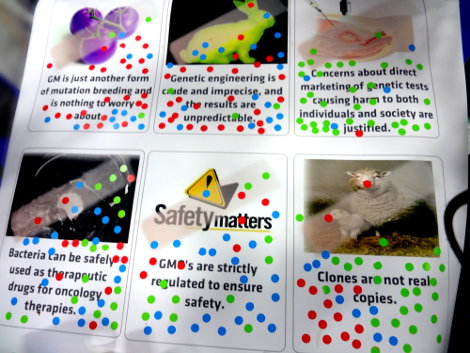
As you can see, there was a great response on this Synthetic Facts poll and we were asked to post the results of these 'checked facts'. Since we made it to the World Jamboree in Boston, we can show the results of the facts that were checked by the audience. These results are listed below.
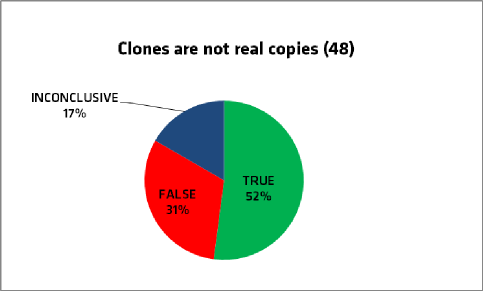
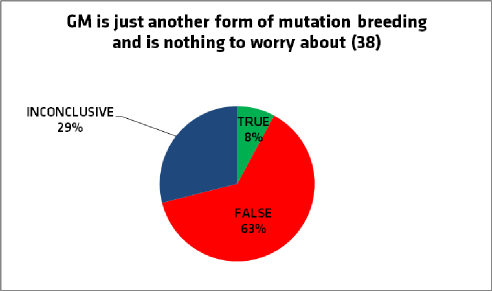
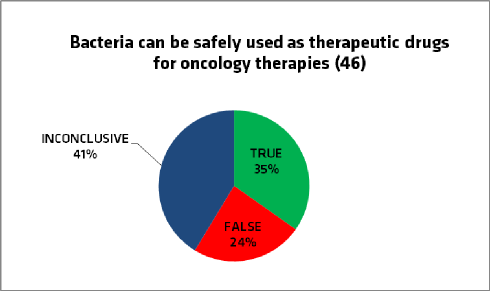
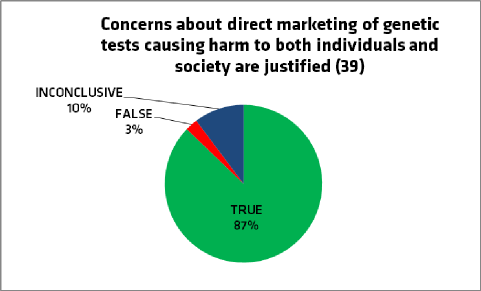
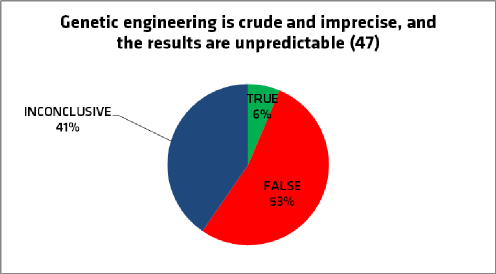
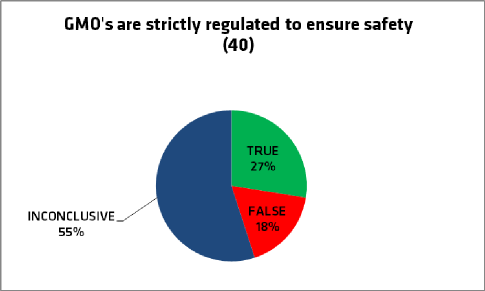
As can be observed in the results shown above, many Synthetic Facts are not straight forward. with this poll we discovered that even for students and professionals in synthetic biology, the synthetic facts are not just black or white, but they also have a large gray area in between.
Synthetic Facts: The Webpage
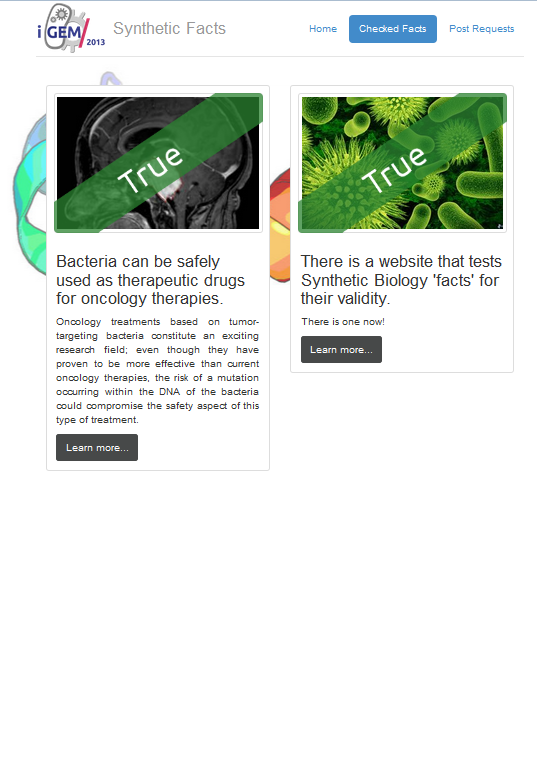
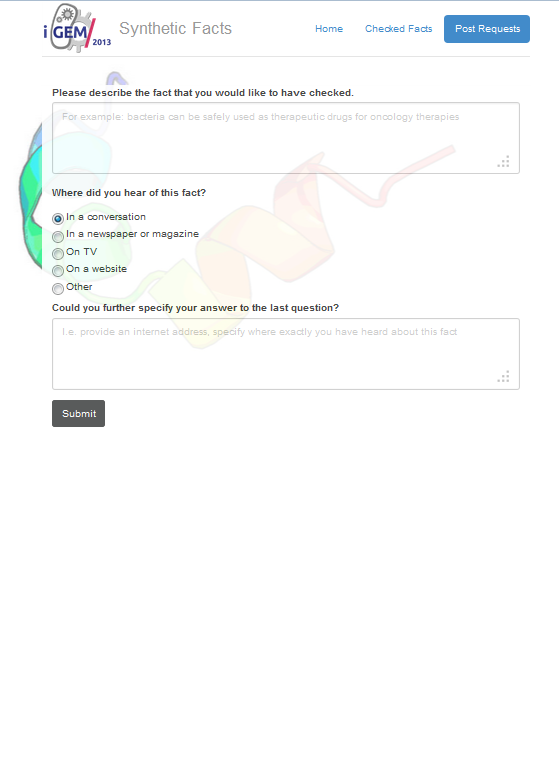
The Syntehtic Facts webpage is part of the TUe network. It is formed by three main sections, the homepage, the checked facts, and the fact check request. The homepage, as shown in , contains the main goal of the fact checker, as well as some of the checked facts. The checked facts section () contains all the available facts that have been verfied by the collaborating parties. Each fact is presented with a picture that explains what the facts talks about, furthermore it also has a banner on top of the image stating if the fact is true, false or uncertain. When looking at each checked fact it is possible to share the link on Facebook, Twitter and Google +. Moreover, it is possible to leave a comment on each fact, opening in this way a discussion forum accessible to every viewer. Finally, the fact check request section () provides a second interactive point for the user, allowing him or her to express his/her concern about a fact he/she wishes to be verified. In order for the request to be sent, three questions have to be answered:
- A description of the fact that is proposed.
- Where was this fact shared, i.e. in a conversation, a newspaper or magazine, on a tv show or website, another source.
- What is the exact source of the fact.
Having these three main sections, provide a source of reliable knowledge in a way that is accessible to everyone, unbiased and based only on the theory and experiments that support each and every of the parties involved in proving or disproving the facts.
Technical Details
To enable all this fact checking magic, a simple content (or fact) management system was developed. This was seen as a better option than using an existing CMS or Q&A system, since existing systems are not completely suitable for managing facts instead of other content and adapting those systems would over complicate the website. Therefore a combination of self-made [http://php.net/ php] code (that is open source and available through the synthetic facts [http://syntheticfacts.tue.nl/ webpage]) and a [http://www.mysql.com/ MySQL] database. All mysql queries were of course correctly prepared to prevent SQL injection attacks. The design was based on [http://getbootstrap.com/2.3.2/ bootstrap 2.3.2] to get the site working as quickly as possible. This setup has resulted in a secure and stable site for the Synthetic Facts project and is suitable for the needs of the project.
 "
"

